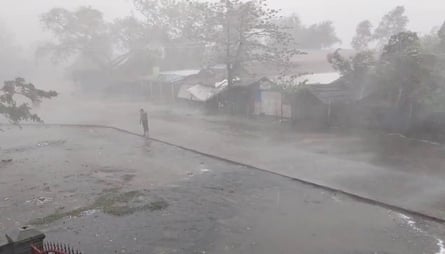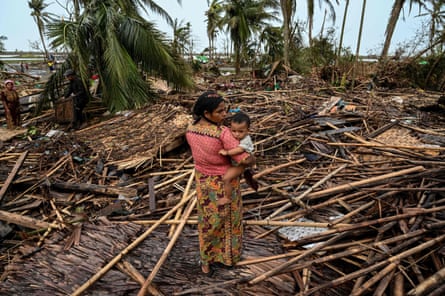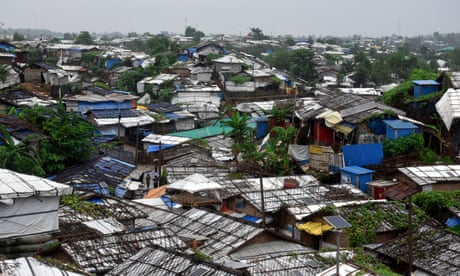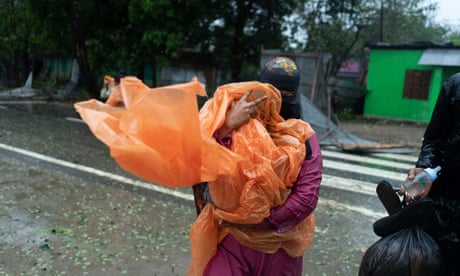"Who will replace the military to hold Myanmar together?" This is the paramount question which looms large among those who think, operate, and interact in "state spaces", that is, the international policy circles of diplomats, UN bureaucrats, think tankers, geo-strategists, and military planners, as well as business lobbyists.
Regarding Myanmar, the prevailing policy presumption seems to be as follows: in ethnically fractious states such as Myanmar where the state is violently contested by multiple populations or "stakeholders," the central military known as the Tatmadaw is stabilizer, the firm hand that keeps the country together. Whatever its crimes – including genocide and other atrocious crimes – all recurring and systemic, the military has been tolerated, within the ASEAN, for instance, at least until the coup two years ago.
For its systemic human rights and atrocity crimes are not seen as having any disruptive impact on international trade, commerce and strategic interests of neighbours and other powerful external actors.
This sadly reflects the rather regressive Westphalian thinking among those who speak on behalf of different external "state actors".
A cursory glance at the Wikipedia entry of the Westphalian ideology of the sacrosanct or absolutist sovereignty of the states, as opposed to the people, is in order. The introduction of the entry reads:
The Westphalian system, also known as Westphalian sovereignty, is a principle in international law that each state has exclusive sovereignty over its territory. The principle underlies the modern international system of sovereign states and is enshrined in the United Nations Charter, which states that "nothing … shall authorize the United Nations to intervene in matters which are essentially within the domestic jurisdiction of any state.
According to the principle, every state, no matter how large or small, has an equal right to sovereignty.[2] Political scientists have traced the concept to the Peace of Westphalia (1648), which ended the Thirty Years' War (1618–1648) and Eighty Years' War (1568–1648).
Outside the neo-Westphalian state circles, the question of who will hold Myanmar together if the military are to be replaced confronts Myanmar's anti-dictatorship dissidents. They/we are envisaging and fighting for "another Myanmar" where what ASEAN leaders officially refer to as "the largest military force", no longer has monopoly grip over the country's politics, economy, and society.
The difference between those who are in the spaces of "state think" and the "another Myanmar is possible" revolutionaries on the ground is this: unlike the international policy makers who embrace the"stability, right or wrong" stance towards Myanmar's military, the instrument of genocide and terror, Myanmar, both the public and the dissidents, no longer believe and accept the military as their national armed forces.
There are many other viable "models" or scenarios between the disastrous extremes of, on one hand, the Washington-imposed regime change in Bagdad which involved dismantling the ruling Baathist party and the entire Iraqi armed forces and, ON THE OTHER HAND, continuing to want to keep Myanmar's genocidal military as "the Giver of Stability" (for the in-country foreign businesses and diplomatic missions in Yangon) and "the Holder of Myanmar State" (against the potential for Balkanization).
We don't need to travel to the Balkans or the Middle East or Latin America although many of us Myanmar have done that as well.
Blood-soaked post-genocidal and post-civil war Cambodia is a pertinent case study for all Myanmar. Whatever the form of the Hun Sen government today, the Cambodian strategy – called Win-Win – of replacing the Pol Pot's genocidal troops with the Hun Sen-led new Cambodian people's army while integrating all those rank and file, including Khmer Rouge officers, might offer a promising model.
Last year, during Cambodia's ASEAN Chairship, (Sao) Harn Yawnghwe, the founding director of the Associates to Develop Democratic Burma, better known as the Euro-Burma Office, and I travelled to Cambodia to learn how Cambodians and their international friends brought the bloody civil war to a close in their post-genocide society. We studied their "Win-Win Strategy" by which Vietnam-backed and Hun Sen-led anti-genocidal forces and Khmer Rouge genocidal military forces, supported by US, China and ASEAN, were integrated into a single national armed forces, something most relevant to our country with two dozen ethnic and pro-democracy armed forces.
We are grateful to our Cambodian friends who made serious efforts to help with finding a peaceful Win-Win in a post-genocidal, civil war-torn Myanmar.

The gathering of the two generation of exiles and revolutionaries at Harpers' Ferry, West Virginia, USA, February 1999. (Professor Kyaw Win, the late Dr Vun Sum, Naw May Oo Mutraw, Shan State Army commander and Shan scholar the late Dr Chao Tzang Yawnghwe, the exiled Prime Minister of the National Coalition Government of the Union of Burma Dr Sein Win, the late Dr Marjolaine Law-Yone (Tin Nyo), Dr Maran Laraw, Dr and ex-Captain Thaung Tun, Zaw Oo, Dr Kyi May Kaung, Harn Yawnghwe and Maung Zarni, with an American dialogue facilitator.)
We know full-well what happened in Iraq when the entire national armed forces were dismantled – ala Saddam's armed forces in the name of "regime change". As Myanmar we have the greatest concerns for anarchy, chaos and more violence that may befall our people in transitional periods.
Despite our different ethnic and religious backgrounds, and political choices, (Harn Yawnghwe and) I have worked closely over the last 25 years, and seen mutual appreciation and respect. Besides our circles, there are other dissidents and revolutionaries who have studied other transitional societies and systems.
What Myanmar lack is not human talents or revolutionary experiences, but the international solidarity, especially solidarity from across different neighbours.
One step towards, or one concrete form, offering Myanmar resistance its due solidarity is to re-assess this pervasive regressively Westphalian view that Myanmar military is the only organization capable of holding the country together, despite the overwhelming evidence to the contrary.
The military under Min Aung Hlaing is proven to be the main de-stabilizer. It has violently deported nearly 1 million Muslim Rohingyas across the border onto Bangladeshi soil. In 24 months since the coup, its scorched-earth military operations have resulted in nearly 2 million war-fleeing refugees – called Internally Displaced Persons – in many regions of the country. It has caused the collapse of the country's informal economy which provided the majority of the people with livelihoods. It is the main cause of shame for ASEAN as its credibility has become the butt of international jokes.
To be sure, today's geopolitical situation around Myanmar which favours the status quo. China, India, Thailand and ASEAN, as well as EU view the genocidal military as the "country holder" and formulate their policies accordingly. Let's not be oblivious to the fact that no resistance or revolution is ever waged in ideal or favourable geopolitical and economic conditions.
Have a glance at the history of Khmer Rouge and see how it came about, who and how it was sustained and supported in the 1970's , and how it was treated as the legitimate representative of Cambodia even after the facts of genocide came to light, well into the 1980's. It swept into power amidst the carpet-bombing of Northern Vietnam and parts of Cambodia. It was financially sustained by China. And Singapore provided the genocidal regime with fuel and helped generate foreign income by purchasing Cambodia fish wholesale. The United States and the United Kingdom gave blanket veto protection at the UN in New York. Thailand gave sanctuary to Pol Pot and his deputies to fight back the anti-genocidal forces of Hun Sen from their Thai-Khmer border based. ASEAN served as the genocidal regime's lobbyist in the international circles of state actors.
As my Khmer brother Youk Chhang who directs the Documentation Center – Cambodia, put it, "although 2 million Cambodians were killed, 5 million of us survived and live to rebuild Cambodia."
Yes, Myanmar people are certainly victims of our own internal colonial regime that has turned genocidal towards different communities. As is typically the case with all genocidal regimes, there are also more than one group that suffered Myanmar military's crimes.
Additionally, we are also the victims of the emerging geopolitics. But Myanmar people of all classes and ethnicities deserve a lot more credit to their resilience than they are given. We have preserved, against all odds, for six decades. We resent being seen and treated as mere subject of pity of sympathy.
No other Asian society has lived 70+ years of civil war and state-directed repression. The three generations of Myanmar of all ethnic backgrounds – not just the Karens or Shan or Rakhine but the Bama Buddhists and communists alike – continue to struggle for another better Myanmar. We are not the people that ASEAN or the world should offer platitudes of sympathy. We don't want your sympathy. We demand solidarity as we have given our neighbours, far and near, a hand of solidarity, be they Indonesians seeking to expel their Dutch colonizers in the late 1940's or the East Pakistanis – now Bengali – in their War of Liberation in 1971. (Ask the Rohingyas about the solidarity and refuge they offered their anthropological kin across the border in Tek Naf and Cox's Bazaar.)
In the face of the dissolution of political parties, birthing and deaths of armed organisations, or wholesale purges of dreaded military intelligence services, scorched-earth operations – known as the Four Cuts – and airstrikes, both the Myanmar resistance and the public at large remain defiant and determined to create a better future for themselves and the generations to come.
They/we will survive even if the military and its structures are radically overhauled to reinvent this institution as a force that protects its peoples, not perpetrate heinous crimes against the people in whose name it justifies its existence.
This unacceptability of the military as it has existed in this repressive, predatory form, permeates the public thinking, irrespective of class, race/ethnicity, age group, gender, or religion. It is based on their decades-old painful experience of life under the boot.
There is also another irreconcilable difference in Myanmar public's consensus view and the general consensus among external actors who typically operate in the state spaces – ASEAN, UN, EU, and so forth.
Despite its genocides – note the plural, judicially recognized or not – war crimes, and crimes against humanity, external actors continue to view the military as a legitimate stakeholder of Myanmar. They are still doing business with the military, albeit with a bit more public relations sensitivity: for regional stability; for military and intelligence cooperation; for trade and commerce; for geopolitical equations.






